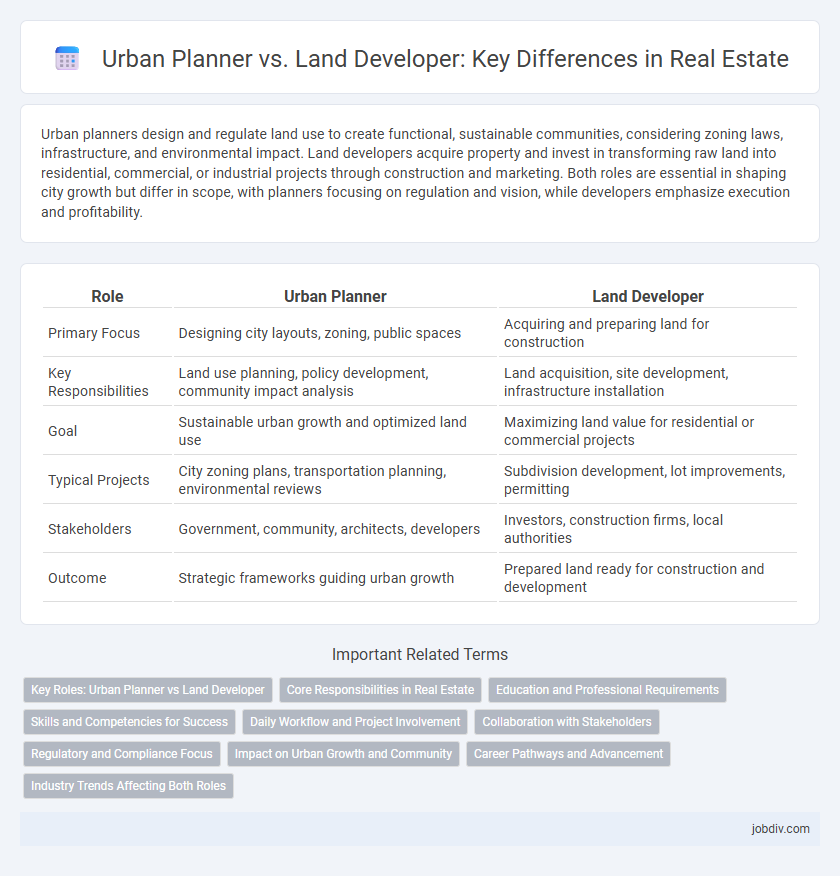Urban planners design and regulate land use to create functional, sustainable communities, considering zoning laws, infrastructure, and environmental impact. Land developers acquire property and invest in transforming raw land into residential, commercial, or industrial projects through construction and marketing. Both roles are essential in shaping city growth but differ in scope, with planners focusing on regulation and vision, while developers emphasize execution and profitability.
Table of Comparison
| Role | Urban Planner | Land Developer |
|---|---|---|
| Primary Focus | Designing city layouts, zoning, public spaces | Acquiring and preparing land for construction |
| Key Responsibilities | Land use planning, policy development, community impact analysis | Land acquisition, site development, infrastructure installation |
| Goal | Sustainable urban growth and optimized land use | Maximizing land value for residential or commercial projects |
| Typical Projects | City zoning plans, transportation planning, environmental reviews | Subdivision development, lot improvements, permitting |
| Stakeholders | Government, community, architects, developers | Investors, construction firms, local authorities |
| Outcome | Strategic frameworks guiding urban growth | Prepared land ready for construction and development |
Key Roles: Urban Planner vs Land Developer
Urban planners design and regulate land use to create functional, sustainable communities by considering zoning laws, environmental impact, and infrastructure needs. Land developers focus on acquiring land, financing projects, and managing construction to transform raw land into residential, commercial, or mixed-use properties. Both roles collaborate closely to balance regulatory compliance with market demand and long-term urban growth.
Core Responsibilities in Real Estate
Urban planners focus on designing functional land use plans that promote sustainable growth, community welfare, and environmental stewardship, often collaborating with local governments and stakeholders to create zoning regulations and public infrastructure layouts. Land developers concentrate on acquiring land, managing permitting processes, and overseeing construction and marketing to transform raw parcels into residential, commercial, or industrial properties designed to maximize profitability. Both roles require deep market analysis, regulatory compliance, and strategic project management to meet the evolving demands of the real estate market.
Education and Professional Requirements
Urban planners typically require a bachelor's or master's degree in urban planning, geography, or civil engineering, often holding credentials such as the American Institute of Certified Planners (AICP) certification. Land developers usually possess degrees in real estate, construction management, or business, combined with experience in project management, zoning laws, and financial analysis. Professional development for both roles involves continuous education on land use regulations, environmental policies, and market trends to effectively navigate complex real estate projects.
Skills and Competencies for Success
Urban planners excel in regulatory knowledge, spatial analysis, and community engagement, enabling effective land use strategies and sustainable development planning. Land developers require strong project management skills, financial acumen, and negotiation abilities to successfully acquire property, secure permits, and execute construction projects. Both roles demand proficiency in GIS technology, market analysis, and stakeholder collaboration to align development goals with urban growth and zoning regulations.
Daily Workflow and Project Involvement
Urban planners concentrate on zoning, land use regulations, and community impact assessments, ensuring projects align with long-term urban development goals. Land developers manage the acquisition, financing, and construction phases, coordinating contractors and stakeholders to transform raw land into market-ready properties. Daily workflows for urban planners revolve around policy analysis and stakeholder meetings, while land developers focus on project logistics and regulatory compliance.
Collaboration with Stakeholders
Urban planners collaborate closely with government agencies, community members, and environmental experts to design sustainable and functional urban spaces, ensuring alignment with regulatory frameworks and public needs. Land developers work alongside architects, investors, and contractors to translate these plans into viable construction projects, balancing economic viability with design specifications. Effective collaboration between urban planners and land developers fosters integrated development that meets zoning regulations, enhances community welfare, and drives economic growth.
Regulatory and Compliance Focus
Urban planners prioritize regulatory frameworks and compliance with zoning laws, environmental regulations, and community impact assessments to ensure sustainable and organized urban growth. Land developers focus on securing necessary permits, meeting construction codes, and adhering to local land-use restrictions to facilitate project approval and timely development. Both roles require thorough knowledge of municipal regulations, but urban planners emphasize long-term planning standards while developers concentrate on immediate regulatory compliance for project execution.
Impact on Urban Growth and Community
Urban planners shape urban growth by designing land use patterns that promote sustainability, efficient transportation, and community well-being. Land developers drive the physical transformation of these plans into residential, commercial, and industrial projects, directly influencing economic expansion and housing availability. Their collaborative impact determines the balance between development density, green space preservation, and infrastructure capacity in thriving urban environments.
Career Pathways and Advancement
Urban planners typically pursue careers in government agencies or consulting firms, focusing on zoning, land-use policies, and community development, with advancement often leading to senior planning roles or directorships. Land developers usually start in project management or acquisitions, emphasizing property development, site planning, and financing, progressing to executive positions such as development manager or real estate development director. Both career paths require strong knowledge of regulations, market analysis, and stakeholder coordination, but land developers tend to have more involvement in financial and construction aspects.
Industry Trends Affecting Both Roles
Urban planners and land developers both navigate increasing demand for sustainable and smart growth solutions as cities evolve toward green infrastructure and mixed-use developments. The rise of technology-driven tools such as GIS mapping and data analytics enhances decision-making processes, enabling better land use optimization and regulatory compliance. Market trends including urban densification, affordable housing initiatives, and climate resilience policies significantly influence project scopes and investment strategies for both professions.
Urban Planner vs Land Developer Infographic

 jobdiv.com
jobdiv.com